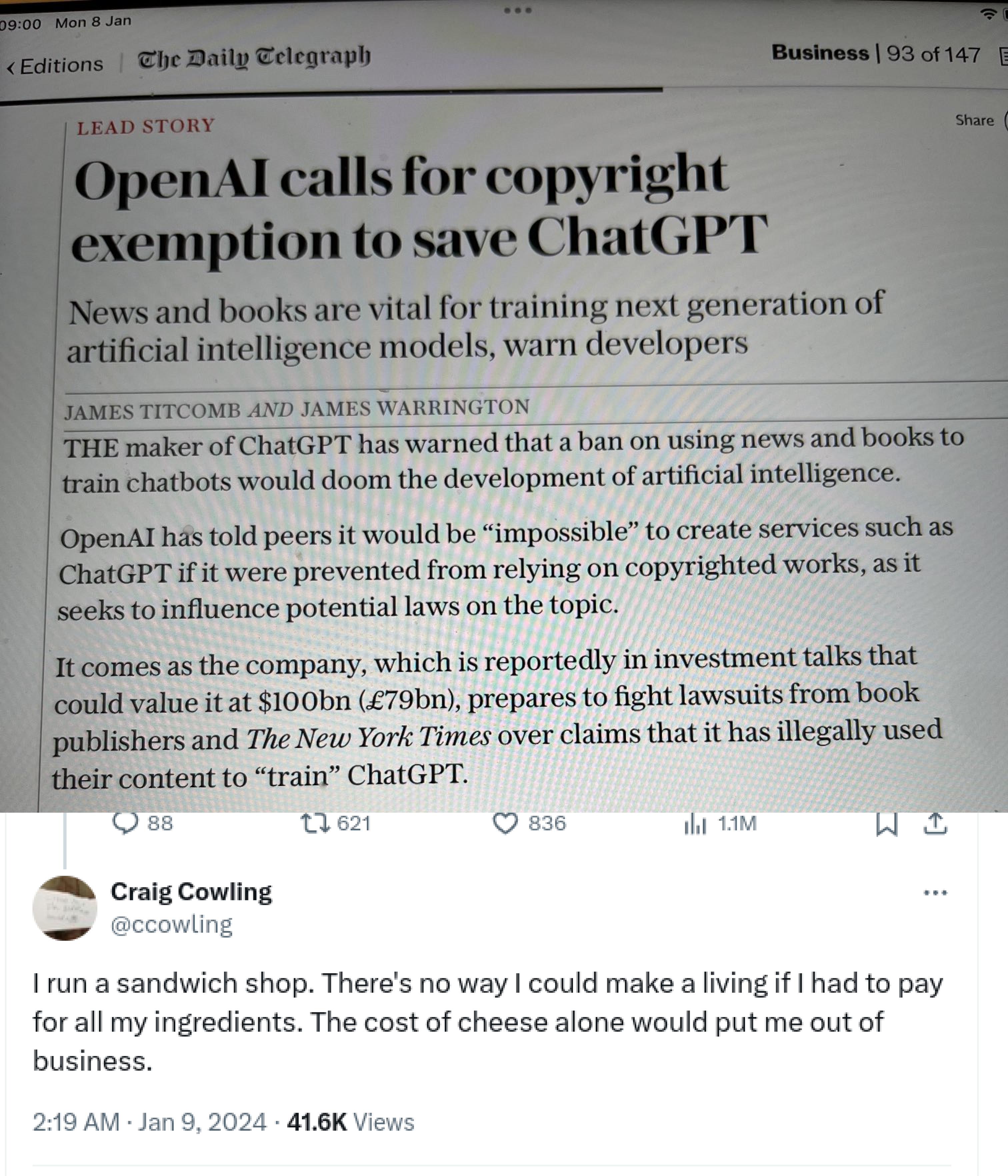Those claiming AI training on copyrighted works is “theft” misunderstand key aspects of copyright law and AI technology. Copyright protects specific expressions of ideas, not the ideas themselves. When AI systems ingest copyrighted works, they’re extracting general patterns and concepts - the “Bob Dylan-ness” or “Hemingway-ness” - not copying specific text or images.
This process is akin to how humans learn by reading widely and absorbing styles and techniques, rather than memorizing and reproducing exact passages. The AI discards the original text, keeping only abstract representations in “vector space”. When generating new content, the AI isn’t recreating copyrighted works, but producing new expressions inspired by the concepts it’s learned.
This is fundamentally different from copying a book or song. It’s more like the long-standing artistic tradition of being influenced by others’ work. The law has always recognized that ideas themselves can’t be owned - only particular expressions of them.
Moreover, there’s precedent for this kind of use being considered “transformative” and thus fair use. The Google Books project, which scanned millions of books to create a searchable index, was ruled legal despite protests from authors and publishers. AI training is arguably even more transformative.
While it’s understandable that creators feel uneasy about this new technology, labeling it “theft” is both legally and technically inaccurate. We may need new ways to support and compensate creators in the AI age, but that doesn’t make the current use of copyrighted works for AI training illegal or unethical.
For those interested, this argument is nicely laid out by Damien Riehl in FLOSS Weekly episode 744. https://twit.tv/shows/floss-weekly/episodes/744



Your average pirate isn’t looking to profit from their copyright infringement.
In a similar way, someone getting busted for downloading a movie is a civil matter, but if they get busted for selling unauthorized copies on DVD then it can become a criminal matter.
They’re saving money which is effectively the same thing.
The pirate is looking to save money with their copyright infringement.
These AI companies are looking to make money from it.
There’s no practical difference between the two.
If I save 100 bucks a month from my expenses it means I have an extra 100 bucks to spend on something else.
If I earn additional 100 bucks a month it means I have an extra 100 bucks to spend on something else.
That may be how you see it, but that’s not how the law works.
Well that’s not just how I see it, that’s how it is.
Also, piracy is illegal. If you think taking copyrighted work of others without permission and training your AI with it should be illegal aswell, then there’s no contradiction there. The people I do take issue with is the ones who see an issue with training AI but not with online piracy.
Well, you can think that but realize that you’re in the minority if you think breaking copyright for personal consumption is the same as breaking copyright for profit. That’s like saying stealing a loaf of bread because you are hungry is exactly the same as stealing a car so you can strip it for parts for resale.
Also, despite what the RIAA and MPAA would like you to believe, downloading a CD or DVD for personal use isn’t illegal, which is why it’s a civil matter when someone is busted. There’s a line that needs to be crossed before the criminal justice system gets involved, and it’s above that sort of thing.
Pirating movies or games for personal use is for profit. You’re saving money, which is effectively the same thing as earning money. The difference is in scale, not in kind. Just because you as an individual person are causing less harm by pirating content than a major corporation is, it doesn’t mean you’re not still commiting the exact same crime both legally and morally speaking.
You’re using a weird definition of profit, which to most people is some sort of financial gain. Saving money isn’t the same as profiting. You’re not turning a profit when you use a $1.00 off coupon on a package of Oreos at the grocer just like you’re not turning a profit if you download a movie.
Also, go look up criminal copyright infringement. That’s what is defined as a crime legally, and downloading a movie or a CD doesn’t meet that threshold unless maybe you’re torrenting it and therefore distributing it. Morally, well you can argue that, but not everyone is going to agree with you.